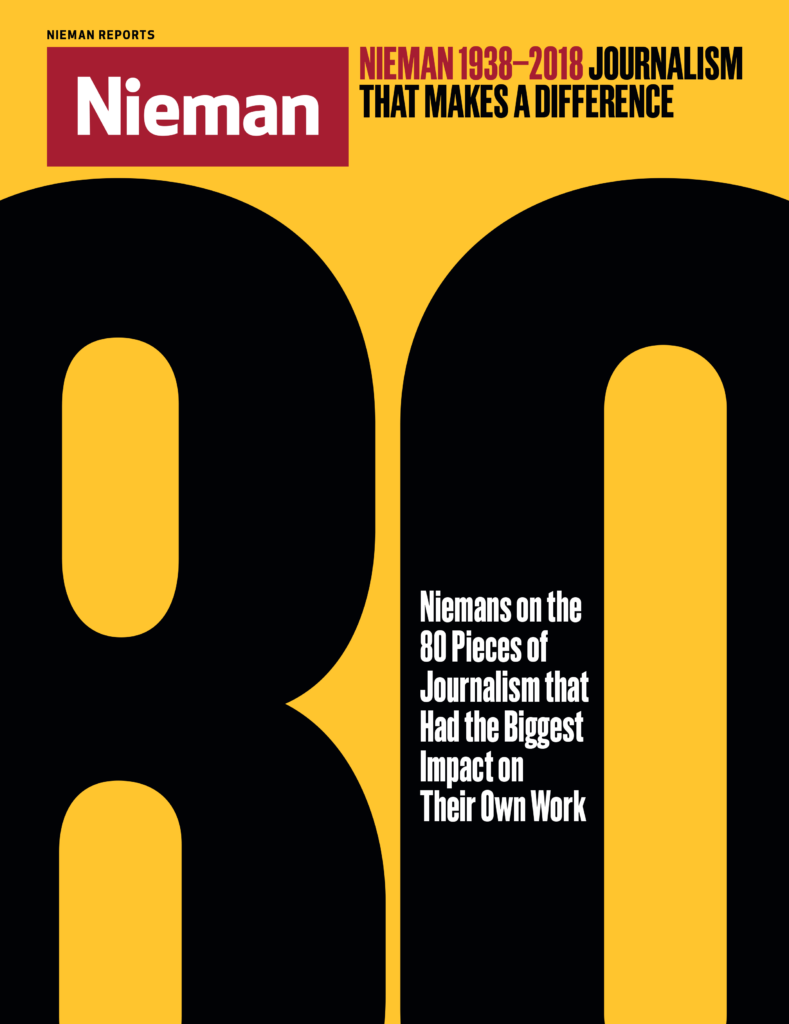
How are great journalists made? Often, it’s pieces of great journalism that help form them, influencing their lives or careers in an indelible way. To celebrate the Nieman Foundation for Journalism’s 80th anniversary in 2018, we asked Nieman Fellows to share works of journalism that in some way left a significant mark on them, their work or their beat, their country, or their culture. The result is what Nieman curator Ann Marie Lipinski calls “an accidental curriculum that has shaped generations of journalists.”
Like so many revolutionary entrepreneurial endeavors, CONNECTAS began in a basement. It was there in Lippmann House that I sketched out a work plan. The nonprofit CONNECTAS, launched in 2013, is now the main collaborative journalism platform in Latin America. This growth has been possible thanks to the trust and support of the International Center for Journalists.
“Big Tobacco Smuggling,” by the International Consortium of Investigative Journalists, was a model for the kind of journalism I aspired to. In 2000 and 2001, a team of reporters in six countries gained access to thousands of internal tobacco industry documents to produce a series of stories that chronicled how tobacco companies worked with criminals to smuggle cigarettes around the world in an effort to expand their markets.
My goal was to build a powerful network of “journalistic camaraderie.” Now it involves more than a hundred journalists in 15 countries in the region. With this community, CONNECTAS has produced more than 250 stories that have brought to light hidden issues in Latin America.
Part of our mission is to identify and highlight cross-border problems, such as a million-dollar shipment to Mexico of illegal Peruvian timber. CONNECTAS also has supported investigations such as Aristegui Noticias’ “La Casa Blanca de Peña Nieto” (“Peña Nieto’s White House”), a story that proved to be a turning point in Mexicans’ perceptions about some of their president’s conflicts of interest. Identifying abuses of power is another major goal, one that we accomplished with an investigation of human rights abuses in Venezuela, a story that was picked up by The Washington Post. We also focus on telling stories in different formats, such as using 360-degree cameras to show the impact of the deforestation in Colombia’s Guaviare jungle. That story was published in coordination with El Tiempo in Colombia.
The participation of CONNECTAS in global investigations such as the Panama Papers and the Paradise Papers, led by the International Consortium of Investigative Journalists, further underscores that the era of the “lone wolf” in journalism is over. The engine that started in the basement of Lippmann House has set in motion a transformative dynamic to foster better journalism in the Americas.
From South to North: the Amazon Timber Trafficking Trail
By Nelly Luna Amancio
and Priscila Hernández
Connectas, Nov. 3, 2017
Excerpt
In the port of Tampico, in the troubled northern Mexican state of Tamaulipas, the final touches were made to an audacious international strategy that led to the clearance of a million dollar shipment of timber of illegal origin that had been impounded through “Operation Amazon,” the largest seizure of its kind in Latin America. It consisted of timber from the Peruvian jungle, an amount equivalent to the freight capacity of 60 semi-trailers. The irregular maneuver enabled the cargo—subject to a confiscation order issued by Peruvian prosecutors—to be delivered to a group of powerful Mexican businessmen.
This investigation by Ojo-Público.com of Peru, W Radio, and the Latin American CONNECTAS journalism platform confirms that the shipment was cleared through the intervention of Mexican and Peruvian diplomats behind the back of the justice system in Peru. Much of the wood that arrived at Tampico had been exported by a Peruvian company—Inversiones La Oroza. A week earlier, its imports to the United States had been banned by The Office of the United States Trade Representative because it had traded timber of illegal origin through the port of Houston.


